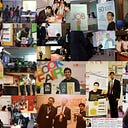#28-Data-First business for Frictionless Customer Journeys
Archimedes — ” Give me a lever long enough and a fulcrum on which to place it, and I shall move the world.”
Give me access to Data-Points and enough computing power and I can create the most future-proof , customer-centric, profitable business.
A lot of traditional businesses discard a few ideas as too futuristic and only meant for tech/internet companies.
Data Maturity models have already started to emerge, and it is not difficult to predict how some industries will be transformed
- Banking- ‘One View of Money’- Predictive and personalized recommendations to retail banking and SME clients. Give saving, spending, and investing advice vetted by algorithms. Credit scores and data models to show lending/default risk upfront.
- Insurance- Real Data-based premiums and AI- managed claims. Health data should determine the insurance premium rather than the age of the client. Driving records and car-sensors will determine motor premiums rather than just the age of the vehicle. Transparency in calculations and simpler models that clients can understand.
- Logistics- Help all businesses, small merchants, and even individual sellers move any good globally and legally in the fastest and cheapest manner possible while sharing real-time updates. Real-time sensors to help track where the good is based on GPS locations and smart cameras. Complete digitalization of the supply chain.
- Industry 4.0 and manufacturing- Digital twins and digital threads generating the data that gives 360' information on the production quantity, quality, and machine’s maintenance.
- E-commerce- Personalized recommendations and best deals based on the wish list and the user data. Big data analytics and Real-time integration on pre-orders and hence the inventory numbers can be managed by the suppliers. Pages and ads that the shopper responded well and converted to sales. AI-Chatbots and voice bots to be a personalized ‘shop buddy’ for the customers.
- Retail- Mall cameras to study and analyze the minutest responses from the shoppers. Making it easier for them to design the experience they want and design the O2O (offline to online) playbook. Biometrics based checkouts, beacon push notifications, and location-based deals.
- Consulting- Information cannot be sold at a premium, a lot of free reports and videos are available that the clients can get freely. How about keeping real-time digital dashboards of current and potential clients that can help in knowing what their priorities are. Relationships will continue to matter, but the consulting company that knows what the clients want may win. Execution and outcome-based models will matter- and the outcome will be measured in tangible data-points.
- Education and L&D- Content is free, so the future value of the knowledge will matter more. Outcome-based models in education will be popular like in consulting. Get educated, get a job, and pay later. Physical infrastructure may no longer be needed for education.
- Power and renewables- They will be measured at the property level (home, office ). You can check usage on your device in a language that you understand (not KWA, etc, or units designed to confuse an average consumer). It will give you a granular picture of your consumption- which room, and which particular appliance is costing you the most. Offices will get a renewable energy score that can get them carbon-credits.
- Smart furniture- A bed that can give a voice command/recommendations in daily/weekly/monthly reports. This will help you to move if your posture is wrong or if you have been a couch potato for too long. It can give you your sleeping updates.
- Smart kitchen and house appliances- Connected appliances that can cook new recipes based on data on the web, clean your room, and refill the grocery supplies. The security and safety of the house members are measured with data points that these appliances generate.
- Social commerce 2.0 and remote work- AI avatars powered with AR/VR tech. Your AI model can manage your social media handles and turn it into a 24*7 action zone if you permit it. You can host parties and attend the business conference in the virtual world
- Healthcare- Real-time recommendations from your smartwatch on your health conditions. The hardware and software upgrades ensure that more and more data points could be added to ‘what your smartwatch can predict on your health’ based on non-invasive technology. Your data is stored in secured clouds where based on your entire bio-metric the data can be retrieved in emergency situations.
- Entertainment and media- Have personalized models of the user so that videos and shows that they like are available 24*7 for them.
Key questions
- Is the business COLLECTING the business, user, partner, and process data?
- Is the business CONNECTING multiple data-points- hardware, or software-based touchpoints within or outside the business?
- Is the business COMPUTING the data it is receiving to improve the customer experience in a secure manner?
- Is the business MONETIZING the data in an ethical manner?
Once the majority population in the world has a smartphone and internet, (up to 90% coverage of the people who participate in economics directly or indirectly), the data-first business will lead the race.
Data-first business is the first step to be an AI (Artificial Intelligence) first enterprise.
The consumers are so comfort-loving that they want the best deals and experiences- with the press of a button, or a voice command, or a biometric. At the same time, they are smart enough to know when a business is being transparent and when it is ‘hiding’ something
Design your business model to win such a comfort-loving customer, if you want to stay relevant in the future.
Sidhartha Sharma — Digital and Data Strategy expert
(Views are personal)
